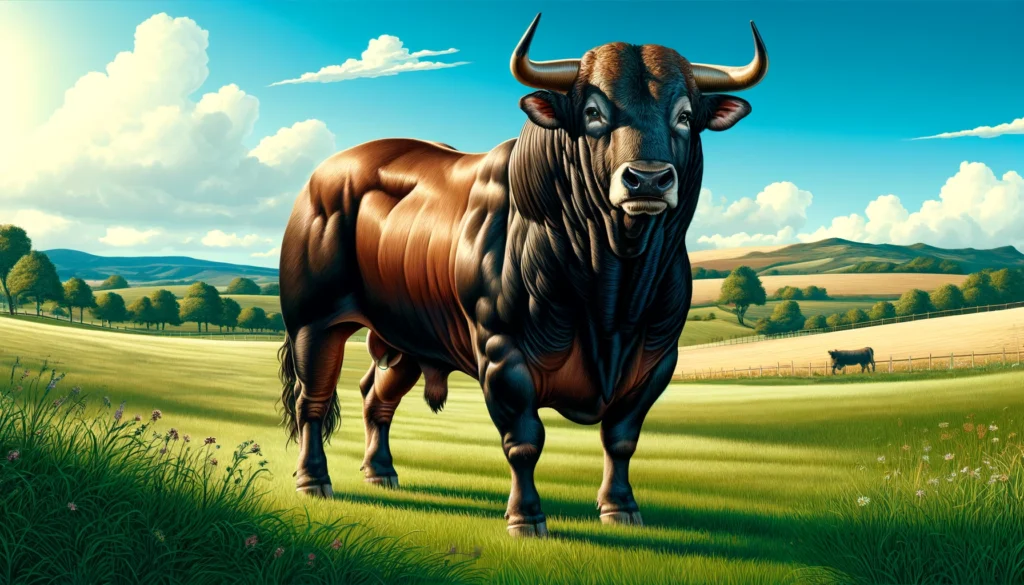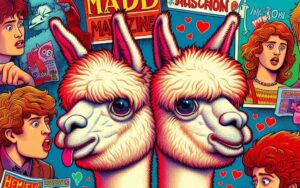
Bull Definition A detailed and vivid illustration of a powerful bull standing in a green pasture. The bull has a strong muscular build with a dark brown coat and la 2.webp.webp

Definition: Bull
A bull is an adult male cattle that is not castrated and is primarily used for breeding purposes. Bulls play a critical role in both dairy and beef production through their contribution to the genetic makeup of herds.
In-Depth Analysis and Applications
- Anatomical and Physiological Characteristics: Bulls are larger and more muscular than cows, with prominent shoulders, neck, and a hump over the shoulder region. They typically weigh between 1,100 and 2,200 pounds, depending on the breed. Bulls have a distinct set of physical traits, including thicker necks, larger horns (if not polled), and a more aggressive demeanor.
- Role in Breeding: Bulls are vital for the reproduction and genetic diversity of cattle herds. In natural breeding, one bull can service many cows within a breeding season. Artificial insemination (AI) has become a common practice, allowing for the widespread use of superior genetics from select bulls. AI also minimizes the need for maintaining a large number of bulls on a farm.
- Breeds and Genetic Contributions: Bulls of various breeds contribute unique traits to their offspring.
- Dairy Breeds: Holstein, Jersey, and Brown Swiss bulls are known for their high milk production genetics.
- Beef Breeds: Angus, Hereford, and Charolais bulls are valued for their meat quality and growth rates.
- Crossbreeding: Bulls are often used in crossbreeding programs to combine desirable traits from different breeds, enhancing productivity and resilience.
- Behavior and Management: Bulls are naturally more aggressive and territorial than cows, requiring careful handling and management. Proper facilities, including sturdy fencing and secure enclosures, are essential to prevent accidents and escapes. Training and acclimating bulls to human interaction can help manage their behavior, but caution is always necessary.
- Economic Importance: Bulls represent a significant investment for farmers, particularly those with superior genetics. High-quality bulls can command premium prices and are integral to the profitability of breeding programs. The genetic improvements they introduce can enhance milk yield, growth rates, and overall herd health.
- Health and Veterinary Care: Maintaining the health of bulls is crucial for their breeding effectiveness. Regular veterinary check-ups, vaccinations, and proper nutrition are essential. Bulls are susceptible to reproductive diseases such as bovine viral diarrhea (BVD) and trichomoniasis, which can impact fertility. Managing stress and ensuring adequate exercise can also improve reproductive performance.
- Environmental and Ethical Considerations: The environmental impact of bulls is similar to other cattle, including methane emissions and land use. Ethical considerations involve ensuring proper welfare, minimizing stress, and preventing injuries through humane handling practices.
- Cultural and Symbolic Roles: Bulls hold significant cultural and symbolic roles in various societies. In many cultures, bulls symbolize strength, virility, and fertility. They are also prominent in rituals, festivals, and sports, such as bullfighting in Spain and rodeos in the United States.
- Challenges and Future Directions:
- Genetic Advancements: Ongoing research in genetics and genomics aims to enhance the desirable traits in bulls, improving productivity and disease resistance.
- Sustainability: Sustainable breeding practices that minimize environmental impact while maintaining high productivity are crucial.
- Market Dynamics: The value of bulls can fluctuate based on market demand, trade policies, and advancements in AI technology.
- Animal Welfare: Ensuring high standards of animal welfare for bulls is essential, with a focus on humane treatment and stress reduction.
- Industry Trends:
- Precision Breeding: Advances in technology allow for precision breeding, selecting bulls with the most desirable traits for specific production goals.
- Global Trade: The international trade of semen from superior bulls facilitates genetic improvement across borders, contributing to global cattle productivity.
- Innovative Management: Modern management practices, including the use of AI and automated systems, are transforming how bulls are managed and bred.
Resources for Further Exploration:
- American Hereford Association
- National Association of Animal Breeders
- University of Minnesota Extension – Beef Breeding

Originally posted 2024-06-11 02:45:46.
Fall off the barn roof and busted your keister? Life on the farm or ranch can be tough on the bum. Need a break? Laugh it off at FarmerCowboy.com, the #1 farm humor site. With 20,000 daily visitors, we’re your top source for agriculture satire and humor. Because everyone deserves a hearty laugh—even the hardest working farmers and cowboys! Join us and turn those long days into fun tales at FarmerCowboy.com.
Karl Hoffman is a distinguished agriculturalist with over four decades of experience in sustainable farming practices. He holds a Ph.D. in Agronomy from Cornell University and has made significant contributions as a professor at Iowa State University. Hoffman’s groundbreaking research on integrated pest management and soil health has revolutionized modern agriculture. As a respected farm journalist, his column “Field Notes with Karl Hoffman” and his blog “The Modern Farmer” provide insightful, practical advice to a global audience. Hoffman’s work with the USDA and the United Nations FAO has enhanced food security worldwide. His awards include the USDA’s Distinguished Service Award and the World Food Prize, reflecting his profound impact on agriculture and sustainability.






